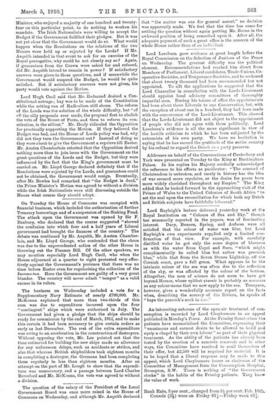Lord Rayleigh's lecture delivered yesterday week at tIe Royal Institution
on "Colours of Sea and Sky," though too summarily reported in the papers, was of fascinating interest. Davy, Bunsen, Spring, and Aufsess were all satisfied that the colour of water was blue, but Lord Rayleigh's own experiments supplied only a limited con- firmation of that view. For example, with carefully distilled water he got only the same degree of blueness as with the water from Capri and Suez, "which might complimentarily be called blue but rather was greenish blue," while that from the Seven Stones Lightship, off the Cornish coast, gave a full green. What appears to be the intrinsic colour of the sea was often due to the reflection of the sky, or was affected by the colour of the bottom. Altogether, the men of science do not seem to have got beyond Homer, whose epithet 7xcnnds is probably as accurate as any colour-name that we now apply to the sea. Tennyson, however, gives a wonderfully accurate report on the facts when, describing the scenery of the Riviera, he speaks of "bays the peacock's neck in hue."














































 Previous page
Previous page